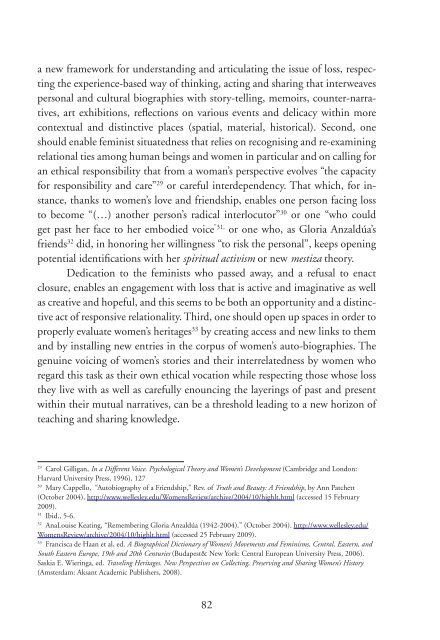Teaching Subjectivity. Travelling Selves for Feminist ... - MailChimp
Teaching Subjectivity. Travelling Selves for Feminist ... - MailChimp
Teaching Subjectivity. Travelling Selves for Feminist ... - MailChimp
Create successful ePaper yourself
Turn your PDF publications into a flip-book with our unique Google optimized e-Paper software.
a new framework <strong>for</strong> understanding and articulating the issue of loss, respecting<br />
the experience-based way of thinking, acting and sharing that interweaves<br />
personal and cultural biographies with story-telling, memoirs, counter-narratives,<br />
art exhibitions, reflections on various events and delicacy within more<br />
contextual and distinctive places (spatial, material, historical). Second, one<br />
should enable feminist situatedness that relies on recognising and re-examining<br />
relational ties among human beings and women in particular and on calling <strong>for</strong><br />
an ethical responsibility that from a woman’s perspective evolves “the capacity<br />
<strong>for</strong> responsibility and care” 29 or careful interdependency. That which, <strong>for</strong> instance,<br />
thanks to women’s love and friendship, enables one person facing loss<br />
to become “(…) another person’s radical interlocutor” 30 or one “who could<br />
get past her face to her embodied voice ”31, or one who, as Gloria Anzaldúa’s<br />
friends 32 did, in honoring her willingness “to risk the personal”, keeps opening<br />
potential identifications with her spiritual activism or new mestiza theory.<br />
Dedication to the feminists who passed away, and a refusal to enact<br />
closure, enables an engagement with loss that is active and imaginative as well<br />
as creative and hopeful, and this seems to be both an opportunity and a distinctive<br />
act of responsive relationality. Third, one should open up spaces in order to<br />
properly evaluate women’s heritages 33 by creating access and new links to them<br />
and by installing new entries in the corpus of women’s auto-biographies. The<br />
genuine voicing of women’s stories and their interrelatedness by women who<br />
regard this task as their own ethical vocation while respecting those whose loss<br />
they live with as well as carefully enouncing the layerings of past and present<br />
within their mutual narratives, can be a threshold leading to a new horizon of<br />
teaching and sharing knowledge.<br />
29<br />
Carol Gilligan, In a Different Voice. Psychological Theory and Women’s Development (Cambridge and London:<br />
Harvard University Press, 1996), 127<br />
30<br />
Mary Cappello, “Autobiography of a Friendship,” Rev. of Truth and Beauty: A Friendship, by Ann Patchett<br />
(October 2004), http://www.wellesley.edu/WomensReview/archive/2004/10/highlt.html (accessed 15 February<br />
2009).<br />
31<br />
Ibid., 5-6.<br />
32<br />
AnaLouise Keating, “Remembering Gloria Anzaldúa (1942-2004).” (October 2004). http://www.wellesley.edu/<br />
WomensReview/archive/2004/10/highlt.html (accessed 25 February 2009).<br />
33<br />
Francisca de Haan et al, ed. A Biographical Dictionary of Women’s Movements and Feminisms, Central, Eastern, and<br />
South Eastern Europe, 19th and 20th Centuries (Budapest& New York: Central European University Press, 2006).<br />
Saskia E. Wieringa, ed. Traveling Heritages. New Perspectives on Collecting, Preserving and Sharing Women’s History<br />
(Amsterdam: Aksant Academic Publishers, 2008).<br />
82

















